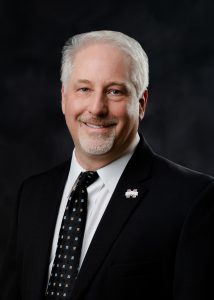Automotive Autonomy Focus of ECE Course
February 24, 2022
As part of this semester’s schedule, Mississippi State University’s Department of Electrical and Computer Engineering (ECE) is offering a one-of-a-kind course on sensor processing for autonomous vehicles.
Associate Professor and Robert D. Guyton Chair Dr. John Ball said, “With the global autonomous car market projected to reach $40 to 60 billion by 2028, Ford, VW, GM, Toyota, Mercedes, Tesla, Waymo, and many other companies need engineers to tackle the many challenges that must be overcome to enable the autonomous vehicle.”

Studio Portrait of John Ball (photo by Robby Lozano / © Mississippi State University)
The senior/master’s level course, titled Sensor Processing for AV’s, is working to meet these needs for trained automotive engineers. It first teaches students autonomy modes such as adaptive cruise control and then moves into operation and processing of the three main sensors on autonomous vehicles, which are cameras, lidars, and radars.
Ball said, “Students apply state-of-the-art processing techniques and have in-depth discussions in class to identify issues and solve real-world problems. During the class, the students tackle several projects involving path planning and control, obstacle detection, and sensor calibration.”
To enhance the students’ knowledge and hands-on experience, MAVS (Mississippi State University Autonomous Vehicle Simulator) – an open-source, physics-based, high-fidelity automotive, environmental, and sensor simulator – is heavily used in the class. The software allows for real-time evaluation of the performance of autonomous perception and navigation. Assistant Research Professor Dr. Chris Goodin with MSU’s Center for Advanced Vehicular Systems (CAVS) is the MAVS architect and project lead.
MSU students are benefitting from the collaboration of the software as part of the comprehensive overview of automotive autonomy, and it provides real-world experience that students can use in the industry.
Electrical engineering senior Walker Thames said, “The topic itself is especially unique and focused, making the class practical, rather than more theory heavy classes. Dr. Ball’s experience in the topic combined with the resources of CAVS on campus make the topic attainable and important. Every project and homework are designed to facilitate learning and hands-on experience with relevant technology.”
For more information on the software, please see the MAVS website.
For more details on Dr. Ball’s academic and research interests, visit his department profile.
The Department of Electrical and Computer Engineering at Mississippi State University consists of 27 faculty members (including 6 endowed professors), 7 professional staff, and over 700 undergraduate and graduate students with approximately 100 being at the Ph.D. level. With research expenditure of the department in excess of $11.94 million, the department houses the largest High Voltage Laboratory among North American universities. For more detailed information on the department, please visit our website www.ece.msstate.edu.
